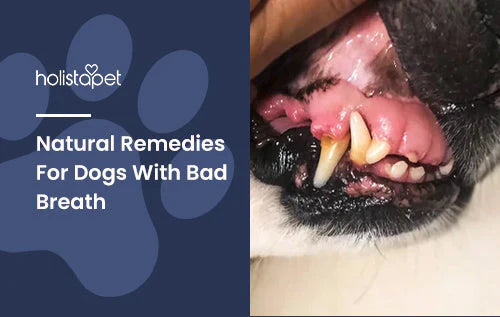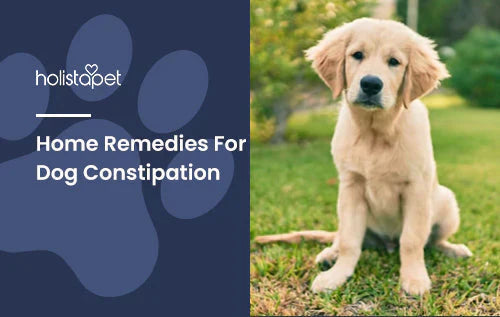If you have a dog, the thought of them catching fleas might have crossed your mind. It doesn't help that a dog can get fleas in a variety of ways. To top it off, you might not notice any signs of fleas until it's become a total flea infestation. If you're wondering how to get rid of fleas, it's essential to understand what causes them to accumulate and how to prevent your dog from attracting them. Using the right products for dogs can make a big difference in flea prevention and treatment. Once you know what to focus on you can plan an attack and incorporate some simple home remedies to vanquish fleas from your dog's fur and home.
What is a Flea Infestation?
When there is an excessive amount of fleas present in your home, you're likely experiencing an infestation. Fleas are insects that are small and reddish-brown. Although they cause similar symptoms, a flea problem is different than mange, ear mites, or ticks. Fleas are external parasites that feed off the blood of mammals and, at times, birds.
Aside from feeding off animal blood, these little suckers are also able to feed off humans' blood. This makes these parasites more of a nuisance. Although they cannot fly, their light bodies and strong legs allow them to jump vast distances. An adult flea can jump up to seven inches high and over a foot in length. Since they are some of the best jumpers in nature they can quickly jump from animal to animal or onto a person.
In small quantities, these tiny mites (1.5 to 3mm) can be challenging to spot. After a flea infestation begins, it's much easier to see all the fleas jumping around on your pets, furniture, curtains, and other surfaces. Another giveaway that your dog has an infestation is if they begin itching more than usual. How to treat flea bites on dogs naturally? If they bite you, you might be able to see flea bites on your body, but some people don't show signs.
How Do Dogs Get Fleas?
Fleas are pesky little parasites that you will no doubt want to get rid of at first sight. However, before you go trying home remedies for dogs with fleas, you should try to understand how dogs catch them first. So, how do dogs catch these mites? For starters, a dog can attract fleas almost anywhere. Here are some of the most common ways these parasites transfer:
Fleas From Outside
The great outdoors is "natural flea territory," especially if the weather is warm and humid. Fleas will often lay their eggs in shady areas. So, whether your dog gets fleas from your backyard, camping, parks, or walking, these parasites may end up inside.

Fleas in Your Home
Besides catching fleas in your backyard, your dog can also contract them inside your home. Since these parasites feed off mammals, through flea saliva they can easily attach themselves to other animals that might roam your property, like mice.
If you are exposed to fleas and don't know it, you can also be a host and bring them into your home. They can hop from your clothes or shoes onto rugs, bedding, toys, furniture, and blankets. Even if one flea makes it inside, it can lay eggs and cause an infestation.
Fleas From Other Animals
Similar to you being a potential carrier of fleas, other animals can be hosts kills fleas too. One of the most common ways dogs get fleas is from being around other animals with fleas.
Dogs Get Fleas at the Groomers and Doggie Daycare
Locations that get a lot of pet traffic like doggie daycares, pet boarding, and groomers are more susceptible to be a hub for fleas. Although most of these places keep their quarters clean and flea-free, you should always be cautious. You can also ask them if they've had any flea outbreaks and of their flea control plan.
Since dogs can get fleas in a variety of ways, it's tough to control whether they pick any up. However, there are a few things you can do to prevent fleas and also treat them. But first, let's understand the symptoms of a dog with fleas and how to spot a problem before it gets worse.
Symptoms of Fleas on Dogs
Besides being annoying, these mites can be hard to spot, sometimes, you might not notice them right away. This is usually the case when pet owners are dealing with these parasites for the first time. So, a few things you should watch out for include:
- Fur loss: Dog alopecia, or hair loss, can occur for various other reasons, including flea bites. A dog might pull its hair out in more severe cases due to excessive biting or licking of the flea bite area.
- Flea dirt: These tiny bloodsuckers can sometimes leave behind a reddish-brown trail along the back of your dog's body, and in some areas in your home. This dirt is flea feces that gets its color from digested blood.
- Pale gums: If your dog experiences sudden blood loss due to fleas, they may become anemic. Pale gums can be a sign of anemia and a severe infestation.
- Irritated red patches of skin: To add to the list of parasitic problems, some dogs are also allergic to flea bites. An allergic reaction to fleas can cause lesions or rashes on your dog.
- Sudden scratching, licking, and biting: This sign might be the easiest to conceptualize. A multitude of fleas crawling, jumping, and biting your dog will inevitably cause irritation and excessive scratching.

If your dog isn't showing any of these symptoms, but you still believe they might have a flea problem, your best bet is to get them checked by a licensed veterinarian. And if your dog has a few of these symptoms, but you're doubtful fleas are the cause, take them to the vet anyway just to be sure.
Home Remedies: Fleas on Dogs
If you're sure your dog has fleas, Googling "home remedies for fleas" might be what brought you here. So, without further ado, here are some of the best home remedies for getting rid of fleas:
Clean, Clean, Clean!
Cleaning is one of the first and most essential steps to combating a flea problem. Not only should you clean your dog, but you should clean your house wherever your dog frequents. Make sure to vacuum all the carpets, throw rugs, furniture, and even low-hanging drapes thoroughly. When you empty the vacuum be sure to do so outside, you don't want any mites escaping back into the house.
If you want to take it a step further, try using a carpet cleaner with hot water after you vacuum thoroughly. Or better yet use a steam cleaner. High heat can kill fleas, larva, and eggs (95°F for 48 hours, 103°F for 1 hour, or 212°F on contact). It's best to repeat this intense cleaning schedule every two days until the mites are gone.
Besides cleaning the carpets, you should thoroughly clean any blankets or bedding your dog has touched, including your own, if necessary. Make sure to use a good detergent and set the temperature for hot water.

Salt, Baking Soda, or Diatomaceous Earth
Salt works as a dehydrating agent against fleas. Simply, take some salt––the more ground up the better––and spread it on your carpets in your home. Let the salt sit for 1-2 days, then vacuum it up. The salt basically starves and suffocates the little buggers. You can also do this with baking soda or diatomaceous earth!
Note that baking soda and salt are pretty harmless for pets to be around, and so is diatomaceous earth, as long as it is food-grade quality. However, make sure not to use any of these on your pet's skin.
Dish Soap
When you mix dish soap with water, its high viscosity becomes a glue that traps fleas. Simply fill a few bowls with this mixture and place one in each affected room. Do this overnight, as fleas are by nature, nocturnal creatures. Some sources suggest placing a light by the bowls overnight to attract more mites.
Besides setting some bowls of soap solution out you can use dish soap and vinegar to make a powerful anti-flea shampoo. Since this shampoo will come in contact with your canine's skin it's best to use a nontoxic soap like Dawn. To make this DIY shampoo simply combine 1 quart of water, 1 cup of vinegar (white or apple cider), and 1 cup of dish soap (or baby shampoo).
Be sure to use enough shampoo to cover your pet thoroughly and massage it in to create a thick lather. Allow the suds to soak in for at least five minutes and then rinse the coat out. After the rinse, you can use a flea comb to comb out any remaining or dead fleas or mites.
Flea Comb
You can find yourself a good flea comb at your local pet store or online. If you are battling an infestation, these combs work great for reducing numbers. You may want to do this outside in case any mites try to jump free. Besides a flea comb, you should also have a bowl with some water and dish soap to run your flea treatment comb through after each pass. The soap will trap the little mites and kill them.
After a flea bath for dogs home remedy and then it's the best time to use a flea comb, it will allow you to catch any mites (live or dead). If the flea comb teeth are close enough, it may even comb out larva and flea eggs. Make sure to comb thoroughly and go over the whole body.

Expert Tip: If you have a long hair breed, a shorter hair cut could help you get at the mites more efficiently. A shorter coat will also make the problem easier to manage overall!
Apple Cider Vinegar
Surely most of us are aware of some type of natural home remedies, involving apple cider vinegar, but did you know it can help get rid of fleas on dogs, in more ways than one? The tiny parasites hate the smell and taste of apple cider vinegar. This remedy won't precisely kill these mites, but it is a strong enough deterrent to get rid of them.
Apple Cider Vinegar Spray
How to kill fleas on dogs naturally? This mixture is a simple topical spray you can use to get rid of fleas naturally . Just find yourself a clean empty spray bottle and fill it up with equal parts (1:1), half apple cider vinegar and half water. If you or your dog finds the smell to be too tart, you can reduce the strength to 1 part cider vinegar to 3 parts water.
Once the mixture is ready, simply spray it on your dog while avoiding the eyes, nose, mouth, and any open wounds. Allow the fur to dry. You can also comb the spray into the dog's coat to help it penetrate better. Repeat this for 2-3 days.
Apple Cider Vinegar Drinking Water
The second way to get rid of fleas with vinegar is to use it by adding a tiny amount to your pet's drinking water. Drinking this mixture will make a dog's skin taste more acidic. Fleas will not want to bite your dog because they dislike acidity.
Lemon Spray
Lemon makes an excellent natural home remedy to get rid of fleas on dogs. Slice a lemon in a few thin slices and add it to a pint of warm water. Next, boil the water and allow the solution to sit overnight. The following day, pour it into a spray bottle and spray it on the most adult fleas infested areas.
Herbal Flea Spray
If you're still wondering how to get rid of fleas you can take the lemon spray a step further, create a natural flea spray using 4 liters of vinegar, 2 liters of water, 500ml of lemon juice, and 250ml of witch hazel.

Natural Flea Repelling Plants
Some plants contain certain compounds, chemicals, and essential oils that can help keep fleas at bay. These plants include Penny Royal, Lavender, Spearmint, and Chrysanthemums. Keep these plants around your home to help repel fleas from you and your dog.
Use CBD To Provide Some Comfort
Cannabidiol, aka CBD, is not a remedy to rid dogs of fleas, however, CBD may provide some relief from the itch and discomfort fleas cause. There are CBD products that can help both dogs with flea home remedies, and cats with many issues. If your dog has fleas you can make use of these home remedies and provide your pup with some CBD Dog Shampoo to make them a lot more comfier while they're healing.
Home Remedies to Prevent Fleas on Dogs
Dog flea allergy home remedy is the best way to deal with an infestation. Understanding how to prevent and treat fleas on dogs once there's an infestation is far more complicated and expensive. So, instead of getting to the point of treating fleas on dogs, you can do a handful of things to be proactive.
- Store-bought flea collars
- Keep your dog on year-round flea and tick medications
- Keep your home, your pet's belongings, and your pet clean
- Spread diatomaceous earth on your carpet then vacuum it after 2-3 days
- Fleas hate the smell of cedar chips, so, spread some in your yard to keep them away
- Make a natural flea collar by soaking a bandana in lavender, rosemary, thyme, garlic, or cedarwood
Although there are a lot of home remedies for fleas on dogs, not all are 100% effective. Many flea remedies will only help manage an infestation, and you may need to take additional steps. The best thing to do is to prevent flea infestations by monitoring your dog carefully and keeping everything around it clean. If you've never dealt with flea larvae before them, it can be especially tricky figuring out how to get rid of fleas for the first time. It would be best if you always kept your dog, belongings, and home clean to avoid flea infestations.
Monitor their behavior for any early signs of an infestation. Catching fleas early can prevent infestations, and home remedies for adult fleas on dogs can help keep the problem from getting worse. You may need professional help with an infestation to eliminate fleas if it's your first time dealing with these little suckers. A pest control professional with years of experience effectively removing fleas will save you time, trouble, and possibly money if you've never dealt with fleas.
Final Thoughts
In conclusion, while home remedies can effectively manage and prevent infestations, they may not always provide a complete solution. Consistently monitoring your dog and maintaining a clean environment is critical to preventing flea problems from escalating. If home remedies prove insufficient, seeking professional pest control can be wise. By staying proactive and addressing flea issues early, you can ensure your dog stays comfortable, and your home remains flea-free.







![Probiotics For Dogs [Soft Chews] - HolistaPet](http://www.holistapet.com/cdn/shop/files/Probiotic-Infographic-1_472d7a29-e30c-435a-9638-1365d8c3a9f9.jpg?v=1725384841&width=104)



























Leave a comment
All comments are moderated before being published.
This site is protected by hCaptcha and the hCaptcha Privacy Policy and Terms of Service apply.